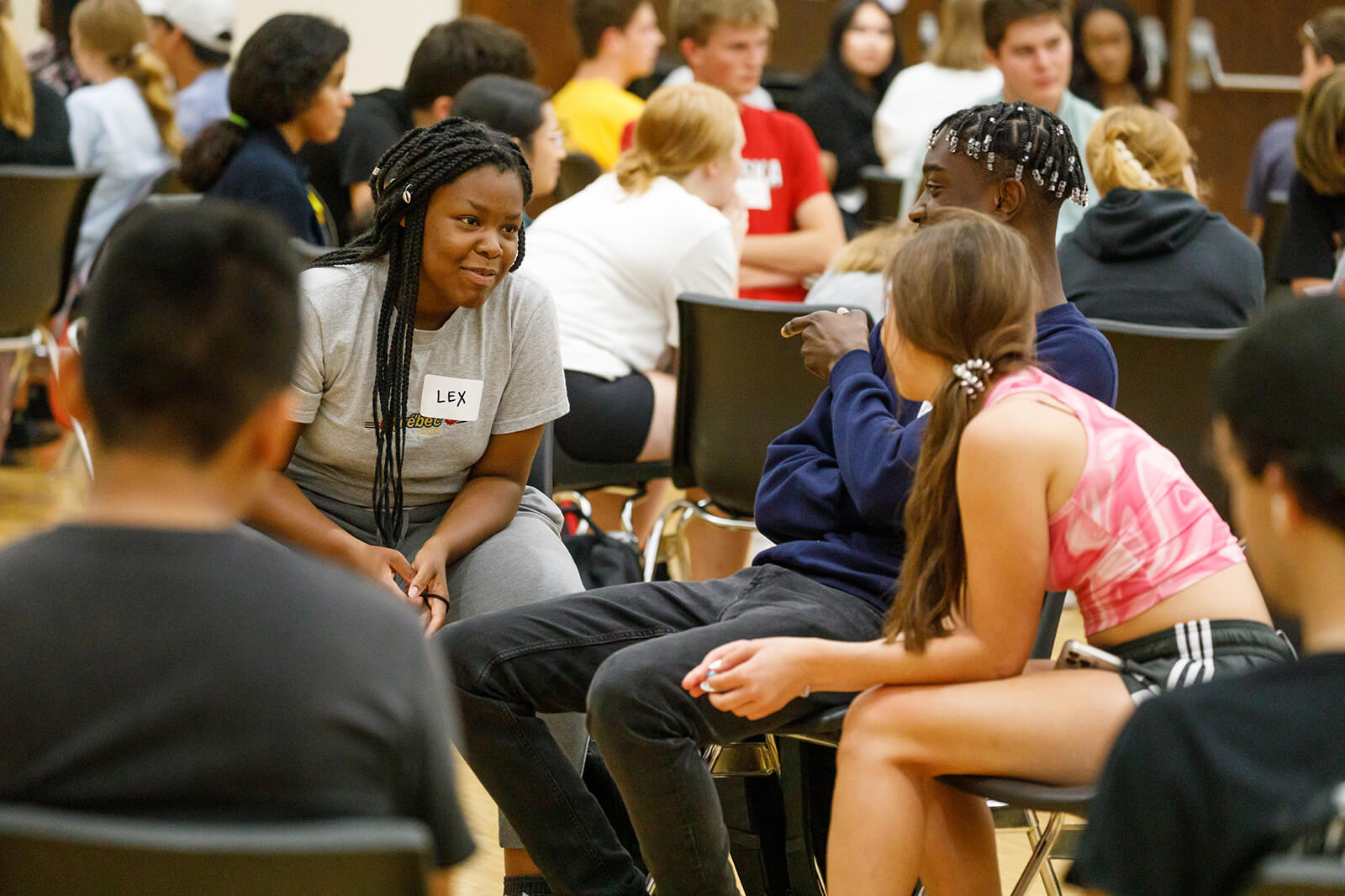
The annual diversity report is a comprehensive report on the university’s diversity, equity, and inclusion efforts throughout the preceding year. It is intended to provide campus and community with a detailed overview on the inclusive excellence efforts at the University – through practice, research, and policy, while providing snapshots on the key data and statistics. This page represents key points of the report, and the full output can be downloaded below.
Download the Full ReportStrategic Priorities 2022-2025 and Areas of Work
Strategic Priorities
The Office of Diversity and Inclusion has identified six core areas to shape and guide the internal and external operations of the unit, all aligning with our mission of leading inclusive excellence at Nebraska and our commitment to excellence guided through operational excellence.
These core areas are:
- Assessment, Research, and Evidence-Based Practice.
- Campus Climate and Education.
- External Relations and Community Engagement.
- Faculty and Staff Recruitment and Retention.
- Infrastructure.
- Student Success and Engagement.
Learn more about each core area in our Strategic Plan.
Areas of Work
Strategic Initiatives
Support and manage the development, growth, and goals of ODI, assist campus unit leaders in developing and implementing strategies for inclusive excellence, and play an instrumental role in advancing the University’s diversity and inclusion strategy. Responsibilities include: diversity strategic planning and implementation; new ventures and partnerships; and ODI-specific activities such as assessments and data analysis, communication and fundraising, budget and financial management, quality of programs, initiatives, and projects.
Faculty Diversity
Develop and implement faculty engagement activities and strategies to address diversity issues particularly relating to recruitment, promotion, and retention of faculty. Responsibilities include: faculty diversity development and recruitment, Academic Diversity Committee support, Faculty of Color Symposium, and underrepresented faculty engagement.
Inclusive Leadership and Learning
Develop and coordinate efforts that build diverse talent searches, onboarding, retention, and success. Develop and lead education and training in support of formal diversity, equity, and inclusive-based practices and policies. Responsibilities include diversity education and training, inclusive leadership development, talent identification and search support, and UNL community building and support.
Inclusive Student Excellence
Develop and coordinate opportunities that increase the participation of minoritized students in high impact practices and implement inclusive leadership activities and programs for all students. Responsibilities include: Office for Academic Success and Intercultural Services, underrepresented student success and support, diversity and intercultural education for students, cultural heritage experiences and awareness, and advising and supporting recruitment and retainment of diverse student populations.
University Committees and Capacity Building
Develop and coordinate opportunities that increase collective and organized thinking and action, provide opportunities for collaboration and innovation, and provide opportunities to build capacity among leaders to advance our institutional prowess for inclusive excellence. Opportunities: Council on Inclusive Excellence and Diversity, Nebraska Community of Learners - Understanding Diversity Through Education (NCLUDE).
External and Community Engagement
Establish practices and initiatives that focus on engagement and outreach through community networking, alumni relations, donor development, marketing, and outreach throughout the state to build increased visibility of UNL’s diversity efforts, increased access to higher education for members of underrepresented groups, and greater responsiveness by the university to the interests of previously underrepresented communities. Opportunities: UNL Vice Chancellor of Diversity Foundation Fund, diversity education and consultation, National Diversity Advisory Board.
Inclusive Excellence at Nebraska
Nebraska Diversity, Equity, and Inclusion Impact Awards
Instituted in 2021 and presented by the Office of Diversity and Inclusion, the Nebraska Diversity, Equity, and Inclusion Impact Awards recognize individuals and groups who actively advance diversity, equity, and inclusion in transformative and sustainable ways at the University of Nebraska-Lincoln.
Our inaugural Nebraska Diversity, Equity, Inclusion Impact Awards recipients for the 2020-2021 were:
- Marianna Burks, Diversity Leadership Staff Award
- Stephanie Bondi, Diversity Leadership Faculty Award
- Batool Ibrahim, Promising Undergraduate Student Leader Award
- Brooke Wells, Promising Graduate Student Leader Award
- The Bureau of Sociological Research (BOSR), Collective Impact Award
Learn more about the award winners
Inclusive Excellence Across Colleges
At Nebraska, diversity and inclusion are central to the mission and pursuit of excellence for all our academic colleges. Our colleges strive to be leaders in expanding opportunities and reducing barriers for all people in Nebraska and beyond through our enduring commitments to diversity, inclusion, and the relentless pursuit of scholarly excellence. True excellence requires that each individual be able to work and learn in an atmosphere of respect, dignity, and acceptance. Each person has something to gain from and offer to our community of learning, discovery and outreach.
Visit the college Diversity and Inclusion websites:
Campus Climate and Culture
Council on Inclusive Excellence and Diversity
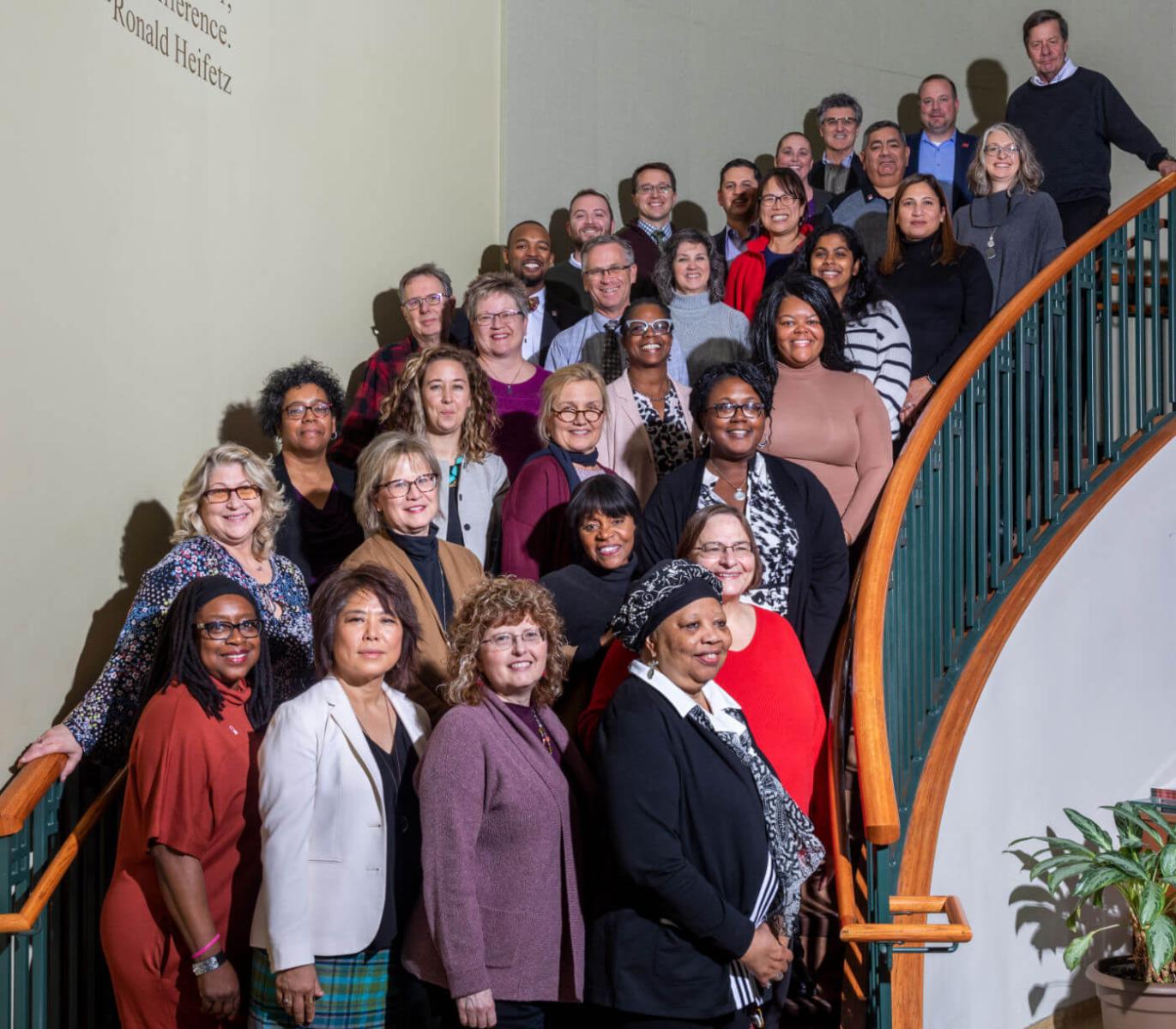
The Council on Inclusive Excellence and Diversity is intended to represent institutional leadership from colleges and primary units on campus, administrators whose responsibilities include diversity and inclusion, and representatives from key institutional groups.
The council is designed to serve as a communications channel between and across units and the Office of Diversity and Inclusion; a space for collective and organized thinking and action; a space to receive updates and share concerns or issues related to campus climate, and to identify opportunities for collaboration and innovation; and a hub to build capacity among leaders to advance our institutional prowess for inclusive excellence.
Diversity Education
Providing inclusive-based learning for our community is a central priority for advancing inclusive excellence at the University of Nebraska-Lincoln. The Office of Diversity and Inclusion provides inclusive learning opportunities, such as workshops and presentations, to the campus community through our Diversity Education request portal as a year-round campus opportunity. For the 2021-2022 academic year, members of our team provided over 50 educational sessions, through various platforms and delivery models, across the institution.
Topics Requested:
- Inclusive Leadership
- Race and Intersections
- Gender Equity
- Multicultural Competency
- All Are Welcome
- Ouch!
- Diversity 101
NCLUDE
Nebraska Community of Learners — Understanding Diversity Through Education (NCLUDE) is a community of learners dedicated to understanding diversity through education. The series of virtual conversations are intended to help students, faculty, staff, alum, and the greater community understand and embrace the opportunities we have to create a greater sense of inclusion for all. The inaugural session of NCLUDE was held in August 2020 and introduced members to the operational functions and mission of the Office of Diversity and Inclusion.
The academic year 2021–2022 highlighted speakers and panelists offering insight into pressing DEI issues:
- October 2021 - Executive Memorandum 40 (Chosen Name and Gender Identity Policy at Nebraska)
- December 2021 - Intersectionality, experiences of queer and trans people of color in Nebraska, featuring Dominque Morgan
- February 2022 - Religious, Spiritual, and Humanist communities in Nebraska moderated by Dr. Max Perry Mueller
- April 2022 - Talking Across Various Lines of Difference in the Classroom featuring Dr. Arden Hill
Breakthrough Recruitment for Inclusive Diversity Growth and Excellence (BRIDGE)
The Office of Diversity and Inclusion’s efforts to improve levels of diversity and inclusion among faculty and staff have resulted in the development and implementation of the BRIDGE Program, or Breakthrough Recruitment for Inclusive Diversity Growth and Excellence.
BRIDGE has two major components. One is the UNL Faculty and Staff Search Best Practices Guide for Inclusive Excellence, a digital guidance resource that provides evidence-based information to assist search committees and hiring officials to increase the diversity of applicant pools and subsequently increase diverse hires. The second is the Search Education and Training Module, a merging of current mandatory search education presented through the Office of Institutional Equity and Compliance with the requisite education module developed for the BRIDGE program. The new search education is mandatory for all persons involved in search processes.
Chancellor’s Commissions
The Inclusive Campus Support Network (ICSN)
The ICSN was formed in August 2021 following a review of university policies, procedures, communications, and resources related to the reporting of campus climate and bias incidents. The review, initiated by Chancellor Ronnie Green, identified a need for a structured campus support team through which all members of our community can recognize, report and respond to campus climate and bias-related incidents. ICSN contributes toward the creation and maintenance of a more inclusive, welcoming, and safe university. We promote equity, dignity, and respect for individuals from a diversity of backgrounds, beliefs, experiences, perspectives, abilities, identities, and orientations. The Inclusive Campus Support Network exists for the purpose of:
- Supporting students, staff and faculty who have witnessed or been the target of discrimination and/ or bias-related incidents.
- Referring individuals to resources that can provide ongoing support.
- Informing the campus community about the frequency and nature of bias incidents reported.
The primary goals are to ensure all community members are treated fairly and to provide support resources to individuals who report incidents.
Minority Health Disparities Initiative (MHDI)
MHDI is an interdisciplinary research initiative funded by the UNL Office of Research and Economic Development and the tobacco settlement funds in Nebraska. The Initiative provides UNL faculty with an infrastructure for conducting innovative research to improve the health status of vulnerable and disadvantaged populations and expand the participation of minorities in health research and education.
LGBTQA+ Center and Women’s Center
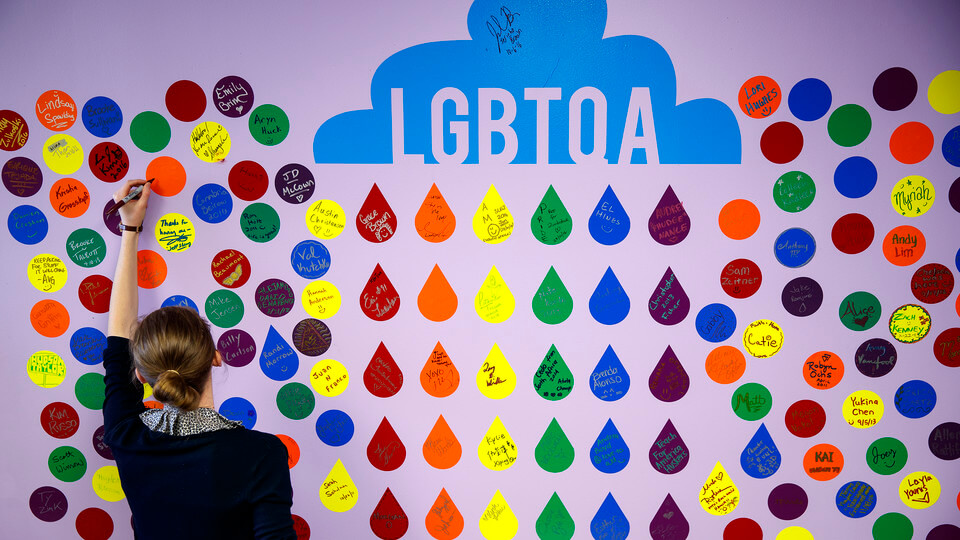
LGBTQA+ Center
The LGBTQA+ Center is dedicated to transforming the campus climate for students, staff, faculty, alumni, and community members by developing and supporting a more inclusive understanding of gender and sexuality through education, advocacy, outreach, programming, and development opportunities.
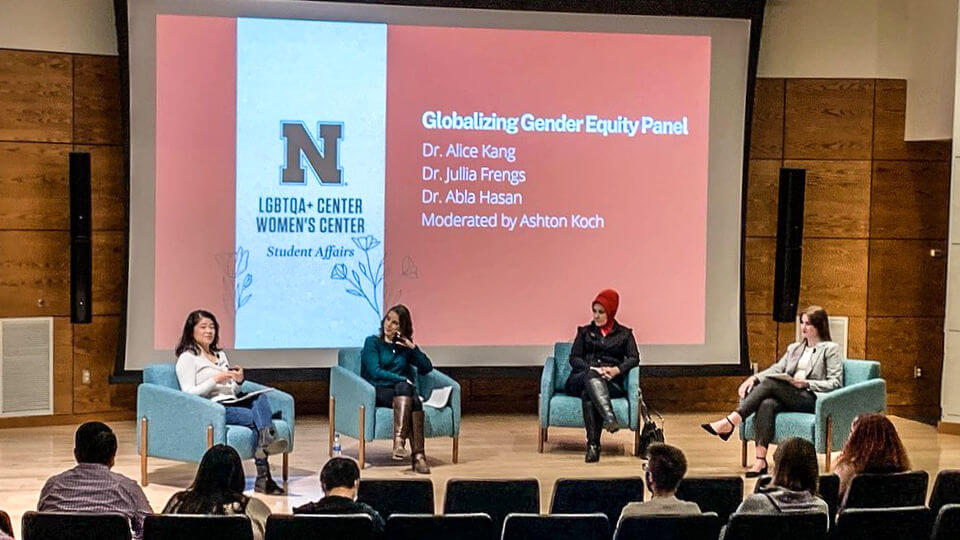
Women’s Center
The UNL Women’s Center serves students and the campus community through a focus on gender, sexuality, and social justice. It has been dedicated to transforming the campus climate at the university by developing and supporting a more inclusive understanding of gender and sexuality through education, outreach, advocacy, and leadership development opportunities for more than 50 years.
31,500
Total Center Contacts (includes walk-ins, appointments, emails, meetings, phone calls, etc)
17,136
LGBTQA+ Center total contacts
14,364
Women's Center total contacts
Student Success Programs
OASIS
The Office of Academic Success and Intercultural Services (OASIS), part of ODI, is designed to enhance student success by promoting academic excellence, diversity awareness, and social engagement. OASIS seeks to transform the lives of students through culturally sensitive academic support and retention services.
The primary goals of OASIS are:
- Increase high-impact programs and opportunities that reflect inclusive excellence.
- Support student retention and success of underrepresented students.
- Expand high-impact initiatives and programs designed to support student experience.
Oasis Student Success Program (OSSP)
OSSP is a year-long program designed to assist students with college transition topics such as time management, social and academic integration, money management, and diversity awareness. The program also connects students with additional University academic support services, social engagement, and leadership opportunities.
17%
6-year graduation rates increased by 17% in two years (2015-2017)
83%
Average of first year retention rates in the past 5 years
37%
Students who averaged a 3.5 GPA or higher (fall 2020)
For the 2021-2022 academic year, over 600 one-on-one meetings with students were held.
Dish It Up
In addition to its student success initiatives, OASIS provides opportunities for campus and community engagement through its weekly offering of Dish It Up. Dish It Up is an interactive weekly conversation where individuals can share their personal views, learn from others, and engage in civil discussions concerning current events, topics affecting students’ lives, UNL, and national and international happenings.
First Generation Nebraska
The University of Nebraska– Lincoln is among 12 First-gen Forward Institutions that have been elevated to Advisory Institution designation for their continued commitment to improving experiences and advancing outcomes of first- generation college students.
With this new Advisory Institution designation in 2021, the university is a regional community leader and works in a co-advisory role with the University of Memphis to offer leadership support to a new Midwest cohort of First Forward institutions, which will include the universities of Creighton, Governors State, Marquette, Eastern Illinois, Wisconsin-Green Bay, Independence Community College, and the University of Nebraska at Kearney.
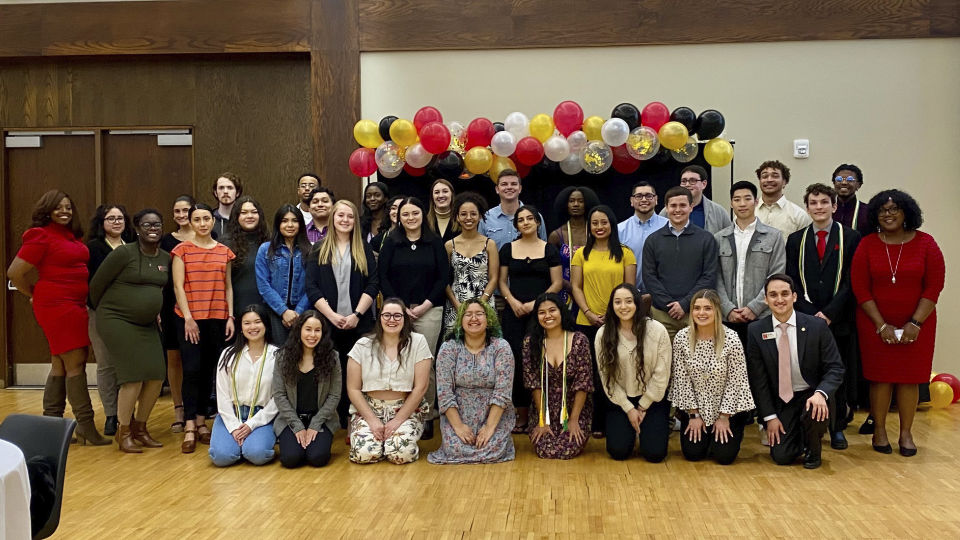
Nebraska College Preparatory Academy (NCPA)
NCPA is an innovative college access program that addresses fundamental inequalities in the education system by preparing first-generation and low-income students for college. Beginning in the eighth grade, NCPA selects students from income-eligible families to join a cohort of their peers and complete a high school curriculum preparing them for the rigors of college coursework.
117
NCPA Scholars have graduated from UNL with little to no student debt to date
85%
Graduation rate for the 2016 cohort
20
Points higher than the university's average graduation rate
33
Points higher when compared to first-generation Pell Grant eligible peers
Events
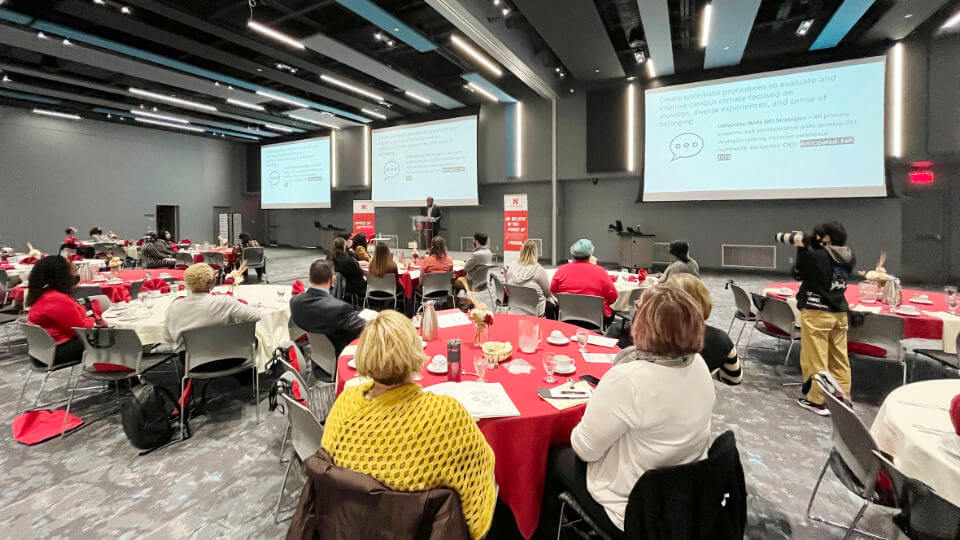
State of Diversity
Since 2019, State of Diversity has provided historical and key data points, reporting, and measurements of our institutional progress toward inclusive excellence. The forum provides the campus community with critical diversity updates, highlighted the achievements and successes of inclusive excellence at Nebraska, and featured a panel of nationally recognized diversity experts and leaders across the country, in a moderated conversation with Vice Chancellor Marco Barker.

MLK Week
Each year, the Office of Diversity and Inclusion presents a week-long celebration of the legacy of Dr. Martin Luther King Jr. Events are designed to facilitate both reflection and action toward a better appreciation of and respect for the dignity of every person. The 2022 MLK Week theme, “When the problems of the world are gigantic in extent and chaotic in detail, give us the power of endurance,” was inspired by a quote by King.
The 2022 events included:
- Jan 18: Dish It Up
- Jan 18-21: MLK Community Service (over 2,000 meals packed)
- Jan 19: MLK Commemorative Celebration (featuring Lisa Ling)
- Jan 20: MLK Mentoring Luncheon
- Jan 21: APU MLK Banquet
Husker Dialogues
Husker Dialogues is an annual initiative designed to introduce first-year students to communication resources and tools to engage in meaningful conversations to help create an inclusive community.
Husker Dialogues includes a community of supporters (students, faculty, staff, and community partners) who serve in a variety of capacities that include conversation guides to facilitate the discussion between first-year students, logistical coordination and support, communication and marketing services, curriculum development and learning resources, and campus and community outreach teams.
The 2021 Husker Dialogues included:
1,300
First-Year Students attended the event in 2021
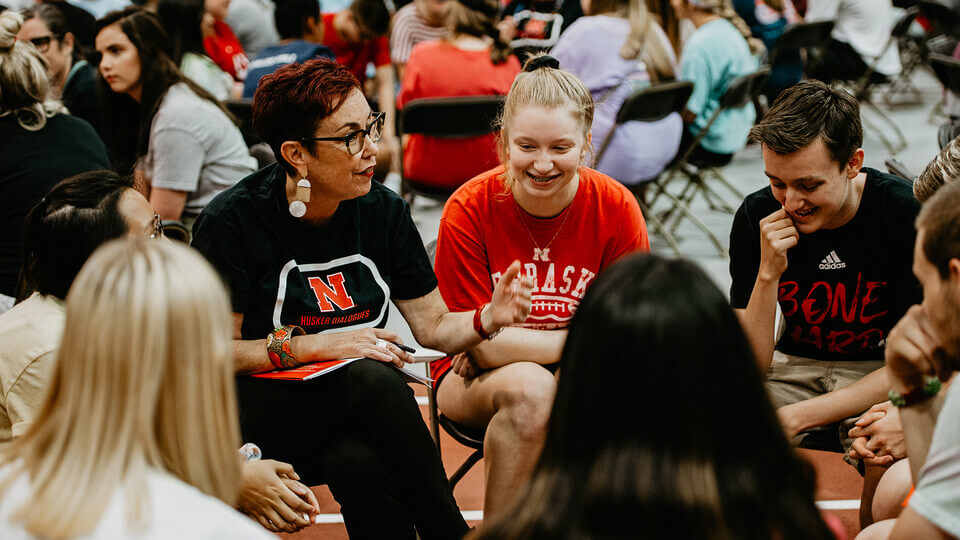
92.8%
of attendees agreed that the student stories increased their awareness of diversity in the campus community
99.32%
of attendees agreed that the conversation guides promoted respectful discussion
90.47%
of attendees found the event thought-provoking
91.75%
of attendees felt more confident in discussing diversity and inclusion issues
92.13%
of attendees agreed that learning about diversity and inclusion is important in their university experience
74.86%
of attendees agreed that they will attend an event focused on diversity and inclusion in the next year
Faculty of Color Symposium
In 2020, the Office of Diversity and Inclusion held its inaugural Faculty of Color Symposium (FOC), an event to recognize the perspectives and unique experiences of faculty of color, observe scholarly contributions and successes, and determine paths forward in fostering a UNL community that celebrates diversity, inclusion, and equity in teaching, research, service, extension, and outreach.
Nebraska Conference for Undergraduate Women in Mathematics
The Nebraska Conference for Undergraduate Women in Mathematics provides role models, insider knowledge, opportunities to present undergraduate research, and a growing community of peers interested in issues related to creating a supportive environment for women in mathematics.
Women, and particularly women of color, are underrepresented in the mathematical sciences, especially among jobs that require graduate education. We at UNL recognize the need to encourage and mentor undergraduate women in mathematics to pursue graduate study in mathematics and to seek mathematical careers.